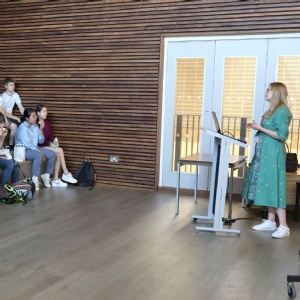Published on 24/07/23

Student Jessie L tells us about the visit and lunchtime talk from Dr Sarah Paris, a Senior Teaching Associate at the University of Cambridge.
On Friday 16 June, we welcomed Dr Sarah Paris to Stephen Perse, who has been an archaeologist, a lecturer, a tutor, now a teaching associate at the University of Cambridge. Her talk was themed around two parts of her journey: how she became an ‘accidental archaeologist’, and the topic of her research.
An ‘accidental archaeologist’
Dr Paris took an unusual approach by starting with the stories behind her CV, which covered a series of challenges she faced since her sixth form years at Stephen Perse. Taking archaeology only as a compromised degree, with her initial thoughts of changing to a law degree after the first year, she ended up enjoying the course and continued with it. Another turning point was her decision to pursue a more science focused route, although she experienced several disappointments after the transition, her perseverance carried her a long way to who she had become today.
She encouraged the students to always follow the path of where their true passion lies, and keep going with it, but also highlighted the importance of having the flexibility that is needed - changing path at any time is not embarrassing, she had emphasised the message several times. The sixth formers, currently handling their UCAS applications, were particularly inspired by her message.
Prehistoric burial sites and the use of red ochre
Dr Paris then moved onto her research topic, starting with a deep, thorough analysis of the field of archaeology. She introduced it as a field that is more than just the discovery of the past, but hunting down solutions to bigger questions such as climate change, human evolution and migration. Her research, which is focused on the use of red ochre in burial sites, stimulated the curiosity of the students once again. She explored the amount of red ochre used in the several burial sites in the site of Khok Phanom Di, Thailand, in relation to the identities of the burials. She spotted the pattern of a generally increasing use of ochre over bodies as the age of the deceased increased.
The students actively engaged with her open ended questions during the talk. After the talk, again students demonstrated enthusiasm, they were interested in what archaeology could tell us about human behaviours and more specific questions about the burial sites.
Thank you again Dr Paris for introducing a topic that is not often considered and bringing some encouragement to the sixth formers.